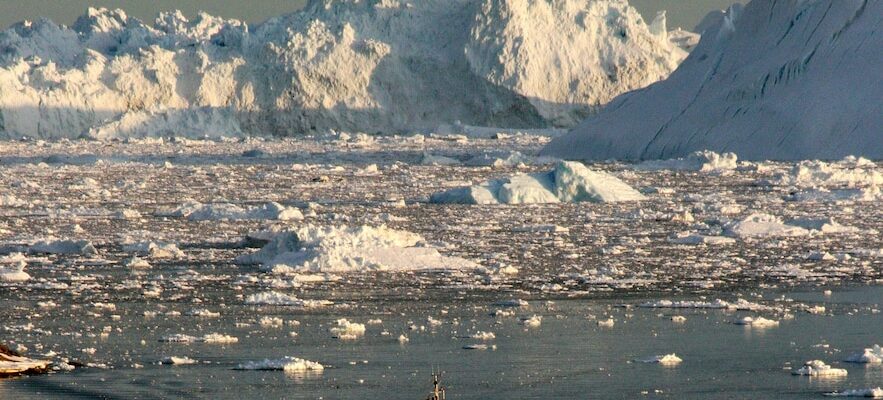He only stayed a few hours on Greenlandic soil, time to take a few selfies and distribute “Maga” (Make America Great Again) caps. But by going there on January 7, just after Donald Trump’s resounding declarations, his son Trump Jr. added a little more confusion and worry to the future of this land populated by 56,000 souls.
By refusing to exclude the annexation by force of the great island of the world, the former future tenant of the White House has in fact caused astonishment in Copenhagen and in Nuuk, capital of this semi-autonomous territory. of 2 million square kilometers belonging to the Danish crown. “Greenland belongs to the Greenlanders. We don’t want to be Danes, we don’t want to be Americans, we want to be Greenlanders”, insisted its Prime Minister, Mute B. Egede, on January 10 during a press conference with his Danish counterpart Mette Frederiksen. And for good reason: far from seeking to devote itself to a new power, Greenland has aspired for complete independence for decades.
Absurd, really?
In fact, the billionaire’s interest in this island rich in natural resources is not new. Already in 2019, during his first term, he proposed buying it from Denmark, before being rejected by Copenhagen, which deemed the proposal “absurd”. Five years later, the newly re-elected president affirmed that control of this territory was “an absolute necessity” for “the national security” of the United States and “freedom throughout the world”. The debate on Greenland’s independence and the latest announcements made by the United States demonstrate the great interest in Greenland, responded the Danish Prime Minister, taking care not to offend Washington. The United States is our closest ally and we will do everything to continue strong cooperation.”
If the scenario of annexation by force seems, at this stage, totally baroque, former members of the Trump administration nevertheless defended last October the hypothesis of a free association agreement with Nuuk – if it were to achieve independence -, like that existing between Washington and the Marshall Islands, Palau and Micronesia. Through this treaty, these three Pacific states grant the United States exclusive military access to their territory – in addition to the right to refuse this access to other powers, in exchange for protection from Washington and development aid. economic.
In such a scenario, however, it would be up to Washington to replace Denmark as the main donor of the Arctic island – between 750 million and a billion dollars per year.
Hefty bill
But is the game really worth it? Behind the show, the bill appears steep for an America which already enjoys great freedom of action among its Arctic neighbor. “The United States has three main interests in Greenland: having access to rare earths, being present militarily and blocking Chinese influence, lists Jon Rahbek-Clemmensen, associate professor at the Royal Danish Defense College, where he directs the Center’s research of studies on Arctic security However, they already largely achieve these three objectives without having to put their hand in the wallet.
Since 1943, the American army has had the Pituffik space base, in the northwest of the island, responsible for the early detection of aerial threats in the Arctic region. “Denmark and Greenland were very open to new negotiations if the United States wanted to benefit from broader access for military purposes,” continues the researcher.
Greenland announced Thursday that it had granted its first major mining concession to a British mining company which will use Chinese workers.
© / The Express
Beyond just security issues, Greenland’s doors are – already – wide open to American interests on the economic level. In 2019, the United States and Greenland signed an agreement to strengthen their cooperation in mining activities. A study published in 2023 showed that 25 of the 34 minerals considered by the EU as “critical raw materials” are present in Greenland, such as graphite or lithium used in batteries. “The Greenlandic authorities have long tried to attract foreign companies to the sector, notes Astrid Nonbo Andersen, historian at the Danish Institute for International Studies. But the shortage of labor on site and the high costs associated with extraction in the Arctic still constitute obstacles.” For this reason, a change in the status of the island would not necessarily have a virtuous effect on the economy. And the Greenlandic mining industry will certainly remain underdeveloped for a long time, despite the wealth of its subsoil.
“No sense”
As for the American objective of curbing Chinese influence, it too has already been largely achieved. “Several Chinese entities tried to gain a foothold in Greenland around ten years ago, but American pressure on both Nuuk and Copenhagen put them in check,” recalls Ulrik Pram Gad, researcher at the Danish Institute for International Studies. Today, everyone understands that the United States will never authorize Chinese investments in infrastructure.” And the message seems to have gotten through. Since 2019, no high-profile project has been proposed by a Chinese player. “On paper, acquiring Greenland may seem tempting for the United States, but when we examine the substance of the question, it does not really make sense,” concludes Jon Rahbek-Clemmensen. “It would even be counterproductive for American interests: ultimately the only ones to benefit from it would be China and Russia.” Because the affair, in addition to costing the American taxpayer dearly, could leave indelible traces in the relationship between Washington and its Danish ally, or even with the European Union. A record that would hardly be brilliant for Donald, “the king of deals”…
.
